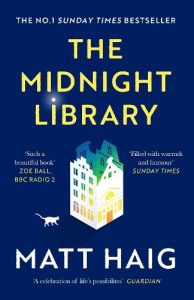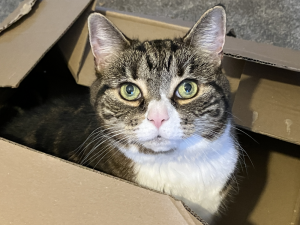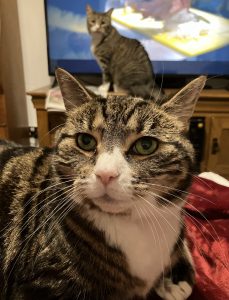Many years ago at a panel discussion featuring some awesome authors, I asked a question along the lines of, “Is there a difference between science fiction and fiction with science in it?” Unfortunately, the panel didn’t grasp the meaning of my question and it wasn’t addressed the way I had hoped.
Recently, as I finished reading Andy Weir’s The Martian and then Project Hail Mary, the question popped back into my head, still unanswered. When is fiction with science in it science fiction, and when is it… something else?
I saw film version of The Martian a while back and loved it. Then I heard a great interview with Weir (see Word Count 5) which reignited my interest in reading the book, so when I finally unpacked it, it shot straight to the top of my TBR list. And it is, indeed, a great book. Weir has a unique voice and the plot is an absolute classic of the ‘get your protagonist up a tree; throw stones at them; then get them down gracefully’* variety.
Project Hail Mary is very much in the same vein. An astronaut finds himself stranded in space, except this time, he’s not just fighting for his own survival but that of humanity. To up the stakes even more, humans aren’t the only species at risk.
What makes both The Martian and Project Hail Mary so fascinating to me, as a massive nerd, is the science. It’s easy to bludgeon people with technical exposition, but I never felt that from Weir. It’s more, “I need to do/stop this thing, and here’s why that’s tricky/important”. For me, it just adds an extra layer of interest that I really enjoy.
But quite a lot of science fiction doesn’t actually have any real science in it. Lots of it is what science could possibly achieve if we could just learn to bend the laws of physics a bit, and much more requires a different universe with completely different physics. But if it features the right tropes – space, aliens, exoplanets, technology, existential threats, etc – no matter how speculative or fundamentally science-free it is, it will still be seen as science fiction.
Some books with science in, The Martian and Project Hail Mary being good examples, feature enough of the right tropes to definitely be science fiction. Other books lack the tropes of science fiction and yet are dependent on science. How should we categorise them?
I’m thinking of books like Richard Doyle’s Flood, which Wikipedia categorises as a ‘disaster thriller’, but which is chock full of science of the meterological and climate varieties, and technical detail about how a major flood of London would actually play out. I remember back in 2002, when the book came out, Doyle had a website that detailed all of the technical specs and science that he’d based his novel on. He’d really done his research and by any definition that research included science. Indeed, Wikipedia says that Doyle ‘was considered an expert on matters related to climate change and the flooding of London. He was invited to the “London Under Water” lecture from the Royal Geographical Society’s “21st Century Challenges” series in June 2008.’
Doyle’s next book, Volcano, was similarly scientific, although this time the topic was more geological in nature. Now, admittedly, the research upon which he based his plot – the idea that La Palma’s Cumbre Vieja volcano has a crack running through it that will result in half the island one day sliding into the sea to create a megatsunami – has since been shown to be wrong. There is no giant crack and half the island will not slide into the sea. But Doyle didn’t know that when he wrote it, just a few years after the theory was posited in the now widely debunked paper by Steven Ward and Simon Day in 2001. Still, despite being science heavy, Volcano is classed as a thriller.
I’m sure a lot of people would argue that it doesn’t matter. Science can cut across genres and that’s a good thing. There are crime novels that feature lots of forensic science, pandemic novels that feature lots of virology and epidemiology, disaster novels that contain a lot of geohazard science.
But perhaps I care because ‘novels with science in’ are the kind of novels I like reading and writing. Argleton, Queen of the May, Disease X, they all have bits of science and tech in, but perhaps not enough to make them science fiction.
Perhaps I care because seeing ‘science’ and therefore ‘science fiction’ as only physics, engineering, technology, astrophysics, cosmology and extraterrestrial sciences restricts the format to male-dominated sciences, cutting women out of the genre by virtue of the sciences they are more likely to have studied and, therefore, the knowledge they are able to bring to the fictional table.
And perhaps I care because as our collective future unfolds, more and more of it is going to require science, and fiction is an amazing way to share knowledge and expertise. We need people to understand how this world works on a fundamental level and if we’re not putting that into our fiction then we’re missing an important sci-comms opportunity. Worse, we’re ceding ground to the misinformationmongers who are filling up people’s heads with antiscientific nonsense that results in actual misery and death (thanks, antivaxxers and climate deniers).
So I’d like to suggest a new genre, one that a book belongs in if it is based in scientific, technical, engineering, mathematical or medical fact, regardless of whether it’s nominally science fiction, thriller, utopian, crime, romance, chick lit, historic or any other genre.
World, please welcome the new genre of Sciency Fiction. I expect to see Amazon updating their categories forthwith.
* Paraphrased from Anonymous, 1897.
{ Comments on this entry are closed }








